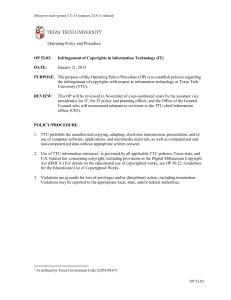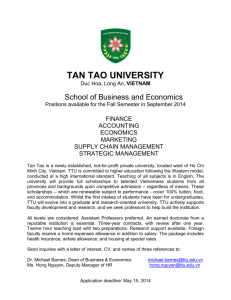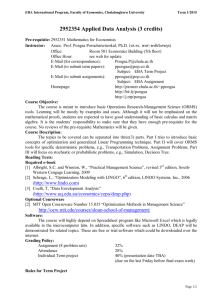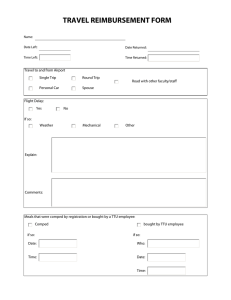Operating Policy and Procedure OP 62.15:
advertisement
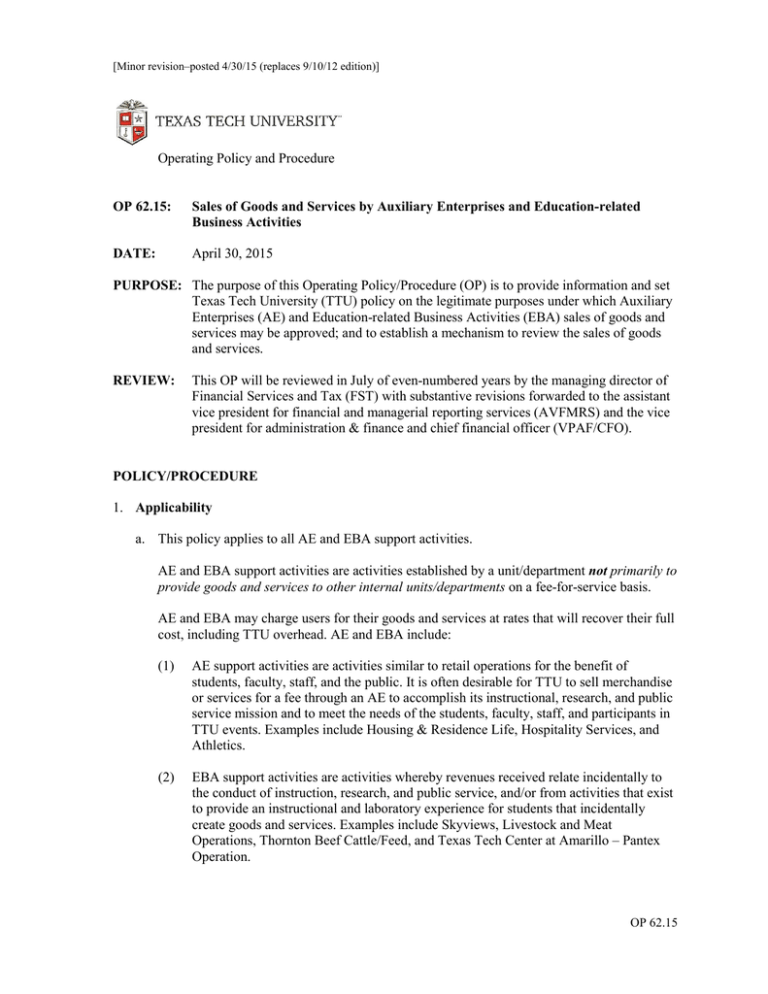
[Minor revision–posted 4/30/15 (replaces 9/10/12 edition)] Operating Policy and Procedure OP 62.15: Sales of Goods and Services by Auxiliary Enterprises and Education-related Business Activities DATE: April 30, 2015 PURPOSE: The purpose of this Operating Policy/Procedure (OP) is to provide information and set Texas Tech University (TTU) policy on the legitimate purposes under which Auxiliary Enterprises (AE) and Education-related Business Activities (EBA) sales of goods and services may be approved; and to establish a mechanism to review the sales of goods and services. REVIEW: This OP will be reviewed in July of even-numbered years by the managing director of Financial Services and Tax (FST) with substantive revisions forwarded to the assistant vice president for financial and managerial reporting services (AVFMRS) and the vice president for administration & finance and chief financial officer (VPAF/CFO). POLICY/PROCEDURE 1. Applicability a. This policy applies to all AE and EBA support activities. AE and EBA support activities are activities established by a unit/department not primarily to provide goods and services to other internal units/departments on a fee-for-service basis. AE and EBA may charge users for their goods and services at rates that will recover their full cost, including TTU overhead. AE and EBA include: (1) AE support activities are activities similar to retail operations for the benefit of students, faculty, staff, and the public. It is often desirable for TTU to sell merchandise or services for a fee through an AE to accomplish its instructional, research, and public service mission and to meet the needs of the students, faculty, staff, and participants in TTU events. Examples include Housing & Residence Life, Hospitality Services, and Athletics. (2) EBA support activities are activities whereby revenues received relate incidentally to the conduct of instruction, research, and public service, and/or from activities that exist to provide an instructional and laboratory experience for students that incidentally create goods and services. Examples include Skyviews, Livestock and Meat Operations, Thornton Beef Cattle/Feed, and Texas Tech Center at Amarillo – Pantex Operation. OP 62.15 April 30, 2015 Page 2 b. This policy does not apply to: 2. (1) Education-related charges for instruction in regular, extension, evening, or continuing education programs; (2) Grants, gifts, cooperative agreements, and contracts from both the public and private sectors that support research, instructional, and service projects; or (3) Service centers established by a unit/department primarily to provide goods and services to other internal units/departments on a fee-for-service basis. Examples of internal service centers include MailTech, Central Warehouse, and Communication Services. Service Centers should consult TTU OP 62.23 to ensure that institutional policies are followed. Exemptions from Policy Exemptions from this policy include: a. Sales that are temporary in nature and the resulting total sales revenues are expected to be less than $50,000 over the entire life of the sales of the goods or services and with a gap of at least 2 years before there are additional sales. b. A request by the division vice president in writing to the managing director for FST for review and approval by the AVPFMRS and VPAF/CFO. 3. Requirements Applicable to Internal Service Activities a. AE and EBA are to charge all internal units/departments at the same rates for the same goods or services. b. AE and EBA with revenue of $100,000 or more are subject to an administrative service charge (ASC). The ASC rate will be set annually by the VPAF/CFO. The ASC may be reduced/waived by the VPAF/CFO. The ASC will be calculated and charged to the AE or EBA on a quarterly basis by the Budget Office. The ASC rate will not exceed the uncapped general and administrative rate of the university’s most recent Facilities and Administrative (F & A) Rate Agreement. At the time of this policy, the ASC rate was 2% and the university’s uncapped general and administrative rate was 5.44%. c. Charging rates and charging practices for AE and EBA with annual sales of $100,000 or more to internal units will be reviewed periodically by FST to determine whether: (1) The account should be reclassified as an internal service center; (2) The rates charged to internal units are reasonable and equitable; and (3) Charging practices to internal units are reasonable and equitable. OP 62.15 April 30, 2015 Page 3 4. Selling Goods or Services to Non-campus Organizations and/or Private Businesses a. EBA shall not engage in any sales activity solely for the purposes of raising revenue to support an educational or research activity if the goods or services are not related directly and substantially to the educational program. b. AE goods or services should represent a resource that is directly related to a unit's educational mission, is not commonly available or otherwise easily accessible, and for which there is a demand in the external community. c. AE rates charged to non-campus organizations and/or private businesses will be equivalent to the prevailing charge for the goods or services by private businesses (e.g., sale of beef cattle, water quality tests, etc.). d. AE must meet the requirements of OP 62.01, Extension of State Credit, before the sale of goods and/or services can be made on credit. Otherwise, the sale of a service to non-federal or state of Texas non-campus organizations and/or private businesses shall be based upon payment in advance or payment upon delivery. Federal agencies, state of Texas, local, city, county, or other agencies are exempt from this provision, provided written agreements or other documents (e.g., state of Texas Interagency Cooperation Contracts (IAC)) are on file in the TTU Purchasing and Contracting Office to pay for the service. e. AE and EBA, for all proposed sales to other universities or governmental agencies that exceed $5,000, shall provide information about the proposed sale to FST, which shall determine whether the sale is appropriate to classify as an unrestricted sale of goods and services because: (1) TTU is committed to compliance with the sponsored project restrictions and reporting requirements usually associated with governmental support of university activities; (2) Most university interactions with governmental and quasi-governmental agencies involve restrictions and reporting requirements; and (3) Proper identification of sponsored project interactions enables TTU to follow established compliance procedures. Unrestricted sale of goods and services by AE and EBA are different from gifts and sponsored projects. The following are some typical characteristics of unrestricted sales: (4) The goods or services are delivered without detailed reporting; (5) The AE and EBA structure any work plan for activity and determine all necessary expenditures; (6) The AE and EBA bear the risk of profit or loss on services rendered or goods sold; (7) The amount due from the paying entity is based upon goods or services provided rather than upon cost reimbursement; and (8) The expenditure of the funds received is not restricted in any way by the paying entity. OP 62.15 April 30, 2015 Page 4 Sponsored projects include grants, contracts, and cooperative agreements from both the public and private sectors that support research, instructional, and service projects. The use of the funds received is restricted to the purposes intended by the sponsor; there are often other specific sponsor requirements concerning the use of the funds. f. The request for establishing a new AE account or for approval to begin selling a significantly different type of good or service for an existing AE shall be submitted using the New Fund Web Application. The following information must be included in the request. (1) Names of the non-campus organizations and/or private businesses requesting the services. (If the non-campus organization(s) is/are federal agencies, state of Texas, local, city, county or other agencies, indicate whether agreements, contracts, or other documentation will be required.); (2) If such businesses exist, the name(s), addresses, and rates of at least three private businesses, local or within the state of Texas, which offer and perform the services to be offered by the AE. (3) The proposed rate or charge to non-campus organizations and/or private businesses for the service(s). This rate may not be less than that charged for the same service by the private businesses for such services. If no private business offers the particular good/service, state the proposed rate for non-campus organizations and private businesses. If this rate is not intended to recover all costs of operating the AE, justify the rate proposed. (4) Explain why it is beneficial for the institution to offer this service to non-campus organizations and private businesses. 5. Unrelated Business Income (UBI) a. Revenues derived from goods sold or services performed by TTU to non-TTU users may be subject to federal income taxation as unrelated business income (UBI) when that sale or service constitutes a regularly carried on trade or business that is not substantially related to TTU tax-exempt purposes. The mere fact that an activity generates a source of funds that are then used for exempt purposes does not mean that the activity is related to the exempt purposes. (1) Income derived from royalties, rents from real property, and sales of capital assets are not included in UBI. (2) Examples of activities that may be considered UBI include, but are not limited to, the following: (a) Advertising space for commercial business on the internet or in publications; (b) Providing services related to rental space, meeting halls, office space, or student housing to non-TTU users; (c) Catering (food service, etc.) to non-TTU users; OP 62.15 April 30, 2015 Page 5 (d) Printing or audio-visual sales and services to non-TTU users; and (e) Sale of memberships or rental of equipment to non-TTU users. (3) A myriad of exceptions apply that may exclude the income from an otherwise taxable activity, e.g., income derived from an unrelated trade or business that is carried on primarily for the convenience of its members or that is conducted primarily by volunteers is not taxable. (4) The taxation of each activity is contingent upon a facts and circumstances determination. A survey is sent out annually by FST to assist in making this determination. All sales of goods or services to non-TTU users should be reported. FST will make the determination whether or not any exclusions or exceptions are applicable. If you have questions or require further information, please contact FST. b. Activities that are determined to produce unrelated business income or loss will be included in the institution’s Exempt Organization Business Income Tax Return (Form 990T), which is prepared annually by FST for submission to the Internal Revenue Service. c. The department must adopt procedures to identify to whom the sales were made. In addition, a cost methodology must be implemented to properly allocate indirect costs to the taxable activity to minimize the tax liability. Such transactions may trigger tax consequences that affect financial budgets. d. Sales to external parties may generate Texas sales and use taxes. See OP 62.30 for further information regarding sales and use taxes. OP 62.15
